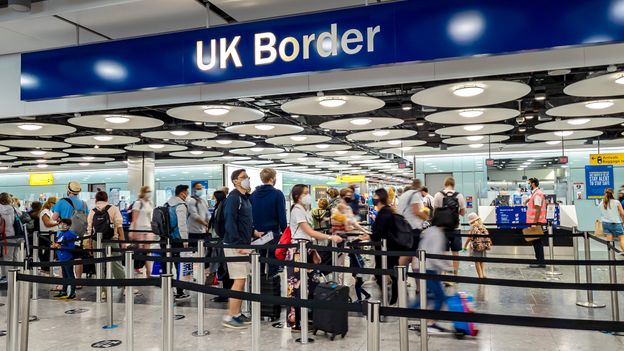The big changes coming to UK and European travel in 2025

 Getty Images
Getty ImagesMany international travellers will soon need to register for an online authorisation before touching down in the UK or many EU nations.
Millions of travellers planning a trip to the UK will soon need to register for an online authorisation before landing – even if they’re just transiting en route to their final destination.
From 8 January 2025, visitors from the United States, Canada, Australia and other non-European nations who currently do not need a visa for short stays in the UK will be required to obtain an Electronic Travel Authorisation (ETA) to enter the country.
To receive an ETA, travellers must fill out an online form and pay a £10 fee (approximately US $12.75). Applicants should hear if their authorisation has been approved in a few hours, but in some cases, a decision may take up to three business days. The authorisation is valid for multiple entries to the UK for stays of up to six months and is good for a two-year period or until the traveller’s passport expires – whichever comes first.
The new authorisation isn’t just aimed at non-Europeans, though: beginning on 2 April 2025, EU nationals will also be required to obtain an ETA before entering the UK. (Citizens of the UK, Ireland and those with valid UK visas will be exempt.)
According to the UK government’s Home Office, the expansion of the ETA scheme (which previously only applied to citizens of seven Middle Eastern nations) is aimed at creating a more streamlined entry system by confirming traveller eligibility to enter the UK before they leave their country of origin. When boarding a plane to the UK, gate agents will verify your ETA status via digital link to your passport thereby reducing time and confusion at border crossings. The Home Office also says the biographic, biometric and contact details collected during the application process will also help to increase security by better tracking traveller movements.
“This expansion of ETA is a significant step forward in delivering a border that’s efficient and fit for the digital age,” Seema Malhotra, UK Minister for Migration and Citizenship, said in a statement. “Through light-touch screening before people step foot in the UK, we will keep our country safe while ensuring visitors have a smooth travel experience.”
 Getty Images
Getty ImagesThe UK’s ETA expansion is just one example of several new electronic entry programmes being rolled out around the world. Starting in the spring of 2025, the EU will require a new travel authorisation for visa-exempt foreigners from 60 nations (including the UK, US, Canada and Australia) before they are allowed to enter 30 EU nations. Similar to the ETA, this new programme, called the European Travel Information and Authorisation System (ETIAS), requires short-term travellers to apply online, pay a small fee (€7 – roughly US $7.40 or £5.80) and then wait up to 96 hours for applications to be approved.
The EU is also poised to launch a separate digital monitoring initiative called the Entry/Exit System (EES), which uses face and fingerprint scans instead of passports to identify non-EU nationals. Unlike the ETIAS, this new security measure (which was scheduled to roll out in November 2024 but has been delayed until sometime in 2025) doesn’t require travellers to apply for anything before they start their trip. Instead, travellers will be registered upon entering any of the 29 EU nations using the system.
According to the EU’s travel information website, the goal of the EES is to modernise border crossings and speed up long immigration lines that have surged with the post-pandemic travel demand. Like other digital entry systems that have been in place for years around the world – such as in the US, Canada, and Australia – the new entry system is also aimed at combatting identity fraud and the number of people overstaying in the EU.
However, not everyone is happy about the increased digitisation of the border entry process. Critics of the expanded ETA scheme are concerned that the extra process and fee will be a barrier to younger and less affluent travellers. Others worry that as nations and regions continue to move towards online entry forms, they’ll no longer receive passport stamps, which have long held a sentimental place among travellers. There’s also a general concern about what happens in the event of a tech glitch.
“I’m sad about [the digitisation of travel] and also concerned,” said Kita Jean, a frequent traveller and member of Nomadness Travel Tribe, an online community for travellers of colour. “Passport stamps are a great way to document memories and look back at, but they’re also good for when processes and technology fails.”
As more places continue to implement digital entry systems and fees, only time will tell whether these new changes will help make crossing borders more efficient or whether travellers view them as an inefficient an unnecessary hoops to jump through.
Related
A New Book Argues That What Happens in Europe Doesn’t…
Remaking the World: European Distinctiveness and the Transformation of Politics, Culture, and the Economy by Jerrold Seigel “No issue in world
Poland plans military training for every adult male amid growing…
Poland’s prime minister, Donald Tusk, has said his government is working on a plan to prepare large-scale military training for every adult male in response t
2025 European Athletics Indoor Championships: Ditaji Kambundji secures women’s 60m…
Switzerland’s Ditaji Kambundji walked away from the 2025 European Athletics Indoor Championships in Apeldoorn on 7 March with much more than her first Europea
Takeaways from the EU’s landmark security summit after Trump said…
BRUSSELS (AP) — European Union leaders are trumpeting their endorsement of a plan to free up hundreds of billions of









